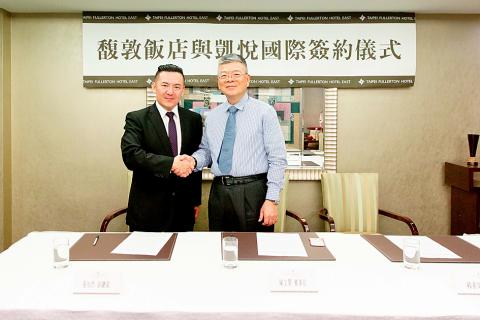Taipei Fullerton Hotel East (馥敦飯店南京館) is making history by paving the way for an urban renewal venture that would turn the property into two new buildings, including a Hyatt Centric brand hotel, the company said yesterday.
The 41-year-old hotel on Taipei’s Nanjing E Road is to halt operations today after securing a partnership with Hyatt Hotels Corp on Tuesday to introduce the Hyatt Centric lifestyle brand in 2024, it said.
“It has become a trend for local hotels to enter into management contracts with international brands and I am glad to join forces with Hyatt Hotels,” Taipei Fullerton president Jonathan Chen (陳文榮) said.

Photo courtesy of Taipei Fullerton Hotel East
The hotel in April won approval from the Taipei City Government for the urban renewal project, making it the first to qualify ahead of Leofoo Hotel (六福客棧), which announced a similar plan in May last year.
Hyatt International Hotel management director of acquisition and development George Chang (張知浩) said that the US hotel chain was attracted by Taipei Fullerton’s convenient location.
It is within a five-minute walk to MRT Nanjing Sanmin Station, a 10-minute drive from Taipei International Airport (Songshan airport) and a 45-minute ride from Taiwan Taoyuan International Airport.
Chen and his wife acquired Taipei Fullerton in 2008 for NT$2.1 billion (US$68.78 million at the current exchange rate) from the foreclosure market.
They have accumulated a fortune from real-estate deals focused on the hospitality sector, including a gain of NT$500 million by selling Eclat Hotels (怡亨酒店) on Taipei’s Dunhua S Road for NT$1.3 billion in 2009, Chinese-language media reported.
The Hyatt Centric is to feature 220 to 240 guest rooms, with an average room rate of NT$8,000 per night, Chen said.
Taipei-based Continental Development Corp (大陸建設) is to carry out the construction of the two 25-story buildings.
Apart from the Hyatt Centric, Chen and Continental Development plan to construct 130 boutique apartments of 30 to 50 ping (99.2m2 to 165.3m2) priced at about NT$1.5 million per ping, he said.
Continental Development chairman Christopher Chang (張良吉) earlier said that his company would receive 28.67 percent of floor space after completion of the project, while Chen would keep the remaining 71.33 percent.
Chang said that he expects the construction to cost Continental Development NT$2.32 billion.
The two sides have not reached a consensus on whether to turn the new units into serviced apartments, Chang said.

BYPASSING CHINA TARIFFS: In the first five months of this year, Foxconn sent US$4.4bn of iPhones to the US from India, compared with US$3.7bn in the whole of last year Nearly all the iPhones exported by Foxconn Technology Group (富士康科技集團) from India went to the US between March and last month, customs data showed, far above last year’s average of 50 percent and a clear sign of Apple Inc’s efforts to bypass high US tariffs imposed on China. The numbers, being reported by Reuters for the first time, show that Apple has realigned its India exports to almost exclusively serve the US market, when previously the devices were more widely distributed to nations including the Netherlands and the Czech Republic. During March to last month, Foxconn, known as Hon Hai Precision Industry

Taiwan Semiconductor Manufacturing Co (TSMC, 台積電) and the University of Tokyo (UTokyo) yesterday announced the launch of the TSMC-UTokyo Lab to promote advanced semiconductor research, education and talent development. The lab is TSMC’s first laboratory collaboration with a university outside Taiwan, the company said in a statement. The lab would leverage “the extensive knowledge, experience, and creativity” of both institutions, the company said. It is located in the Asano Section of UTokyo’s Hongo, Tokyo, campus and would be managed by UTokyo faculty, guided by directors from UTokyo and TSMC, the company said. TSMC began working with UTokyo in 2019, resulting in 21 research projects,

Taiwan’s property market is entering a freeze, with mortgage activity across the nation’s six largest cities plummeting in the first quarter, H&B Realty Co (住商不動產) said yesterday, citing mounting pressure on housing demand amid tighter lending rules and regulatory curbs. Mortgage applications in Taipei, New Taipei City, Taoyuan, Taichung, Tainan and Kaohsiung totaled 28,078 from January to March, a sharp 36.3 percent decline from 44,082 in the same period last year, the nation’s largest real-estate brokerage by franchise said, citing data from the Joint Credit Information Center (JCIC, 聯徵中心). “The simultaneous decline across all six cities reflects just how drastically the market

Ashton Hall’s morning routine involves dunking his head in iced Saratoga Spring Water. For the company that sells the bottled water — Hall’s brand of choice for drinking, brushing his teeth and submerging himself — that is fantastic news. “We’re so thankful to this incredible fitness influencer called Ashton Hall,” Saratoga owner Primo Brands Corp’s CEO Robbert Rietbroek said on an earnings call after Hall’s morning routine video went viral. “He really helped put our brand on the map.” Primo Brands, which was not affiliated with Hall when he made his video, is among the increasing number of companies benefiting from influencer